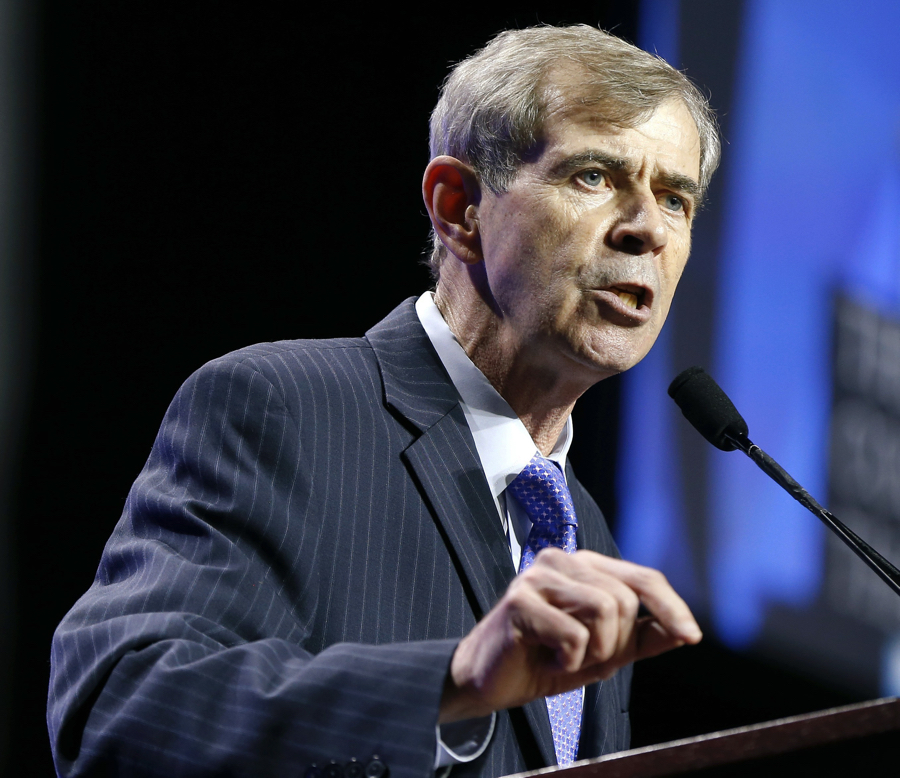Bill Galvin Defeated Challenger Josh Zakim in a Feisty Democratic Primary Battle
He will now face Swampscott Republican Anthony Amore.

Photo via AP/Michael Dwyer
Secretary of State Bill Galvin has survived a spirited primary challenge from Boston City Councilor Josh Zakim, winning a decisive 67.4 percent of the vote, to Zakim’s 32.6 percent.
Speaking with reporters after a speech to supporters, Galvin chalked the win up to “my familiarity with the state and the people’s familiarity with me,” according to the State House News Service. “There’s not a part of the state in all my time that I haven’t been to and spoken with, haven’t worked with local officials.”
In what was at times a feisty contest, Galvin faced strongly worded attacks from the 34-year-old challenger, who made the case that it was time for a fresh take on the office. The secretary oversees elections, public records, corporations, and securities. Galvin, 67, has been secretary for nearly a quarter century, a tenure longer than that of any other state official.
Zakim, the son of the namesake for the famous bridge, blamed Galvin for not pursuing aggressively enough reforms to increase voter turnout, including same-day and automatic registration. He accused Galvin, who has recently embraced those reforms, of being late to the party.
But it seems Galvin’s extensive record, widespread name recognition, and the raw power of incumbency in Massachusetts were enough to prevent a shakeup of the office.
Things had gotten surprisingly heated. As the two traded swipes on the campaign trail, Galvin reminded voters of a potentially embarrassing fact from Zakim’s past: that he hadn’t voted in several elections, including for John Kerry in 2004 and Deval Patrick in 2006. “He doesn’t bother to vote, let’s not vote for him,” campaign ads blared. Zakim’s campaign pointed out he has voted every year since he moved to Boston in 2011, adding memorably, “It’s somewhat surprising that Secretary Galvin didn’t just make an ad yelling at Josh to ‘get off my lawn.'”
Zakim, meanwhile, expanded his criticism of Galvin outside the scope of the office, making note of the incumbent’s track record on several progressive causes. Galvin voted as a state representative in the 1980s in favor of the death penalty, against abortion rights, and against the rights of gay parents to adopt children—and has since sought to explain those votes. Zakim also nicked Galvin, whose duties include deciding when to hold his own primary, for picking an inconvenient date for voters after a long weekend. Galvin has cited conflicts on other possible days.
Polling showed support leaning strongly in Galvin’s favor. He outperformed Zakim in a June survey 46-17. His long list of endorsements included the Boston Globe, Senate President Karen Spilka, House Speaker Robert DeLeo, and former Congressman Barney Frank. A survey gauging name recognition for the two candidates found voters were overwhelmingly more familiar with Galvin—70 percent had heard of him, while an equal portion had never heard of Zakim.
A troubling sign came early on in the contest, though, when delegates at the Massachusetts Democratic Convention endorsed his young challenger by a vote of 55-45, a result that surprised even Zakim. The city councilor also had support from Boston Mayor Marty Walsh and the popular Congressman Seth Moulton.
In his remarks after the results came in, Zakim still had strong words for Galvin:
The first words I spoke on this campaign were about increasing access to government through expanded voting rights. I talked about Automatic Voter Registration, Election Day Registration, Early Voting, Weekend Voting and No Excuse Absentee Voting. Voting rights are civil rights. And those issues were ignored for far too long on Beacon Hill
Now, in part because of our campaign, Automatic Voter Registration is the law of the land. We still don’t have Election Day Registration, but Secretary Galvin has said he now supports it. I know all of us here will be holding him to his word.
Galvin will now face off with Swampscott Republican Anthony Amore, who has been head of security at the Isabella Stewart Gardner Museum for the last 12 years and overhauled protections at the site after the infamous 1990 art heist.


